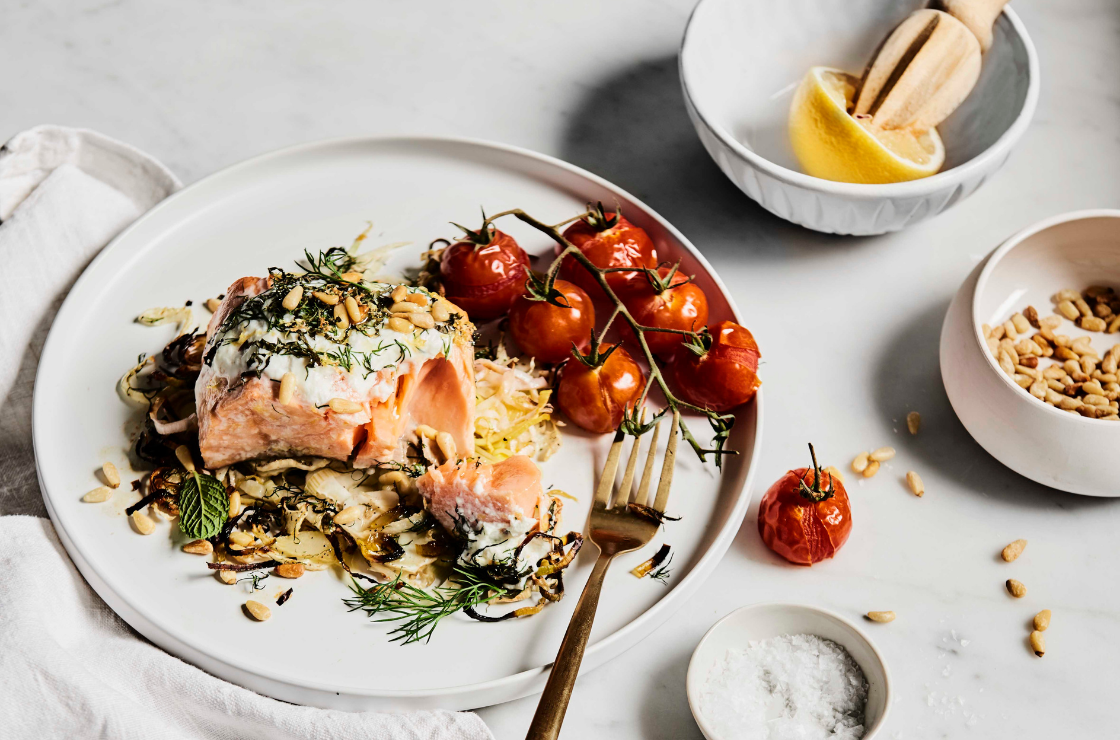
When you’re pregnant or breastfeeding, it’s natural that your body creates extra demands for certain nutrients and vitamins.
Aside from the obvious like avoiding soft cheese when pregnant and upping your water intake while breastfeeding, there are a few additional considerations to take into account.
To help you navigate the supermarket aisles, we sat down with Senior Clinical Dietitian at Sydney’s Royal Hospital for Women, Nikki Levitas, to chat all things pre and postnatal nutrition.
What are some of the foods you should be including in your diet when you’re pregnant?
“It is very important to focus your attention on the quality of the food you are eating, rather than the quantity. During pregnancy you require more of certain vitamins and minerals–up to 50% for some nutrients–therefore choosing nutrient-dense foods that are high in vitamins and minerals is essential. Women aged between 19 to 50 should aim to eat two serves of fruit, five serves of vegetables, three and a half serves of protein, two and a half serves of dairy and eight serves of grains or cereals each day.”
Is ‘eating for two’ a myth or do you need to up your calorie intake?
“You do not need to eat twice the amount of food during pregnancy. In fact, during the first three months of pregnancy, you have no additional calorie needs above your normal diet. During the second and third trimester of your pregnancy you do need to slightly increase your daily calorie intake, but probably by less than you think.”
Are there any foods you should avoid eating while pregnant?
“Some hormonal changes that occur in pregnancy can lower your immunity making it more difficult for your body to fight off illness and infection and may place you at a greater risk of food poisoning. It is therefore very important to be safe and hygienic when it comes to food storage and preparation. You can do this by:
- Washing fruit and vegetables well
- Washing your hands thoroughly before preparing food
- Not consuming food past its ‘best before’ date
- Keeping leftovers in the fridge and only consuming them in the following 24 hours if reheated well.
It’s also a good idea to avoid ‘high risk’ foods like soft cheeses such as camembert, ricotta, feta, blue cheese; unpasteurised dairy products; soft serve ice cream; pate, meat or fish pastes; raw or undercooked eggs, rare meats, cold deli meats from delicatessens, sandwich bars or buffets; smoked ready to eat seafood, oysters, sashimi and sushi; sprouted seeds such as alfalfa, bean and snow pea sprouts.
It is also obviously important to avoid alcohol during pregnancy. Try not to eat fish more than three times per week due to the potential mercury content of some fish, too.”
When you’re breastfeeding, what are some of the foods you should be including in your diet?
“A healthy, balanced diet can help support postnatal recovery and breastfeeding. Iodine is very important for your baby’s growth and brain development. Pregnant and breastfeeding mothers should take an Iodine supplement with 150mcg (micrograms) of Iodine. Foods high in Iodine include cooked seafood, fortified bread, eggs and dairy.
While breastfeeding, you need to drink more fluid to replace the fluid used in breast milk (approximately 700mls per day). Try to have a drink every time your baby feeds.
It is also very important to consume a wide variety of high fibre foods to prevent constipation. Eat wholegrain breads and cereals, fruits, vegetables, legumes, nuts and seeds.”
Do you need to consume additional calories when breastfeeding?
“Yes, and breastfeeding can also help you manage your weight after pregnancy. Mums burn about 500 extra calories a day while producing breast milk, which could lead to faster weight loss after birth. Try to fill the extra calories you need with healthy snacks such as yoghurt, fruit, vegetables and hummus and nuts.”
Why does breastfeeding tend to make you so thirsty?
“Soon after starting to breastfeed, you will notice that you feel thirsty more often. This is triggered by oxytocin, a hormone released during breastfeeding, which naturally affects your thirst cues to encourage you to drink more to hydrate yourself and make breast milk.”
For additional resources, where would you recommend people go?
“You can visit the Australian Breastfeeding Association, the Australian Dietary Guidelines or Dietitians Association of Australia for more information.”
Our Founder and CEO, Carla Oates, is a proud ambassador for The Royal Giving Day. A donation on 24 November 2021 will help The Royal Hospital for Women in Sydney deliver hope to women and newborns when they need it most. Find out more or make a donation here.




